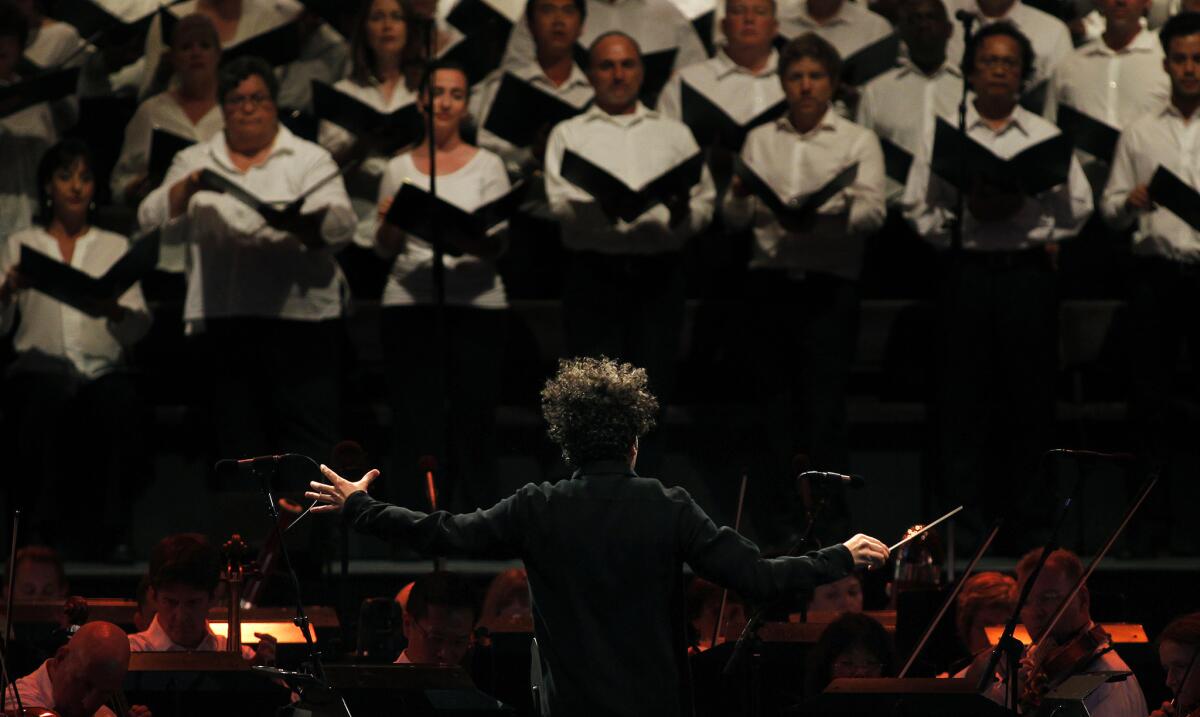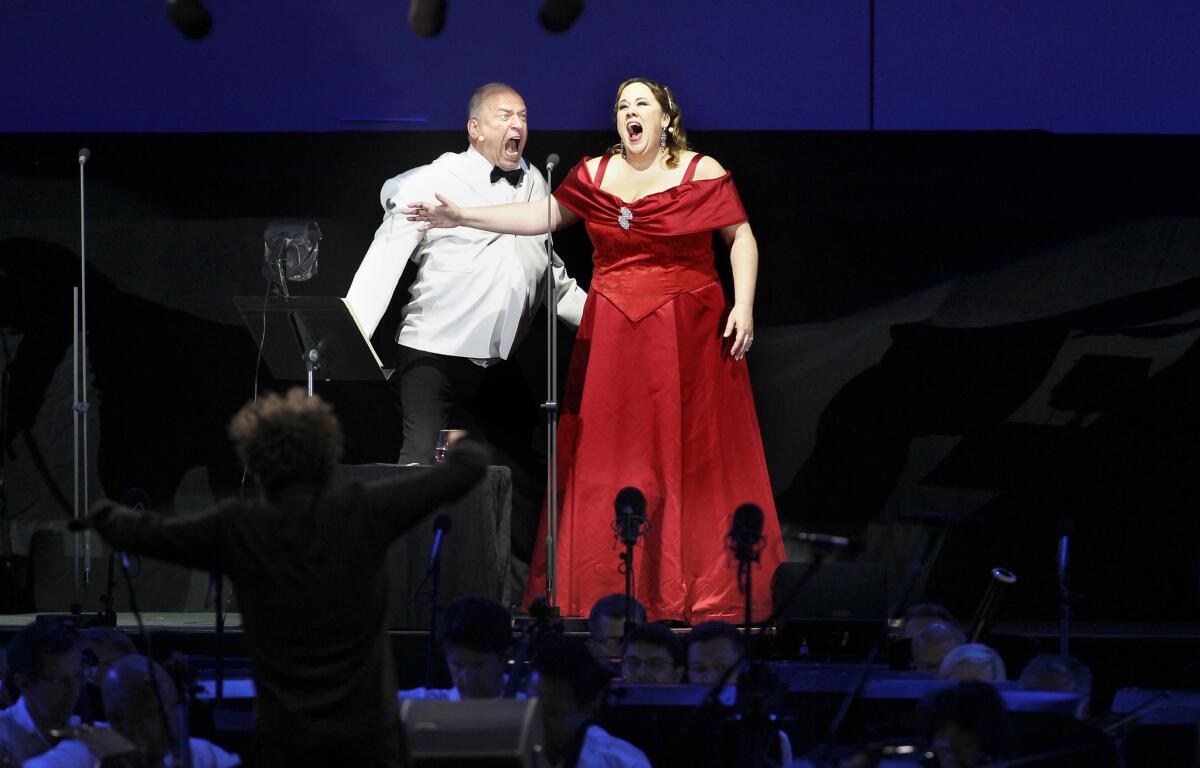Review: Puccini extreme: Dudamel’s gloriously pessimistic ‘Tosca’ an indictment on the appeal of fascism

“Tosca” is Puccini extreme, the composer’s most political opera.
At its center is his most fiery heroine, Tosca, the diva who attempts to live for art under tyranny in Rome during Napoleonic times. Cavaradossi, the painter and revolutionary, is his most heroic tenor role. The lecherous tyrant Scarpia exhibits zero redeeming qualities.
But “Tosca” needs to be about something more. The opera ends so very badly that Puccini pessimistically questions whether political sacrifice in the face of fascism makes any sense at all. For that to be sensed, “Tosca” must ultimately be a conductor’s opera.
On Sunday night at the Hollywood Bowl, Gustavo Dudamel had an excellent cast of compelling singers with healthy voices to turn to in his first time conducting Puccini’s opera. But from beginning to end, it was Dudamel’s “Tosca.”
Sign up for our free Essential Arts & Culture newsletter »
He had a precedent in Herbert von Karajan’s “Tosca” recordings with the Vienna Philharmonic and later the Berlin Philharmonic. The performance with the Vienna Philharmonic happened to have one of the most magnificent of all Toscas with Leontyne Price in her prime, yet it was the orchestral opulence, the colors, Karajan’s broad pacing and the sheer richness on every level that made this glorious 1962 recording a classic. These are also the prime attractions of the orchestrally incomparable later Berlin performance.
In both these instances, Karajan revealed how the orchestra in “Tosca” is a controlling force greater than any individual, good or bad. When that happens, “Tosca” becomes something more than the “shabby little shocker” that musicologist Joseph Kerman famously (or infamously) dubbed it, but rather a telling indictment of the attraction of fascism.
That Dudamel’s “Tosca” on Sunday proved Karajan-esque was striking. Earlier in the week, he had been in high Leonard Bernstein mode with exceptional performances at the Bowl of “West Side Story” and “Rhapsody in Blue.” Yet with “Tosca,” he remarkably turned on a Karajan dime, the German conductor having been Bernstein’s great rival.
It was also remarkable because we shouldn’t ask too much from the Hollywood Bowl. Putting together an opera on the Bowl’s limited rehearsal schedule for a single performance means a fraction of the preparation time that a production gets in an opera house. The amphitheater’s vigorous amplification system, which sounded very impressive on this night and also very loud, adds its own musical character. Microphones magnify every voice equally. Orchestral balances are artificial.
Then again, maybe we should ask too much from opera at the Bowl. Amplified voices allow for the delivery of nuance lost in the opera house. Cello and clarinet solos stood out with an unnatural prominence in the last act, creating an especially moving musical atmosphere.

Here is where the Karajan business came in. Dudamel obviously did not have the luxury of a polishing for a recording and, expansive as he was, he hardly aped Karajan’s tempos measure for measure. Dudamel further remained altogether supportive to the specific big voices at hand, particularly with Julianna Di Giacomo and Russell Thomas as Tosca and Cavaradossi, respectively. But Dudamel showed little concern for dramatic shock.
Rather, Dudamel’s “Tosca,” like Karajan’s, became a portrait in the inevitability of fascism’s enduring appeal. The lushest of orchestral accompaniments produced a backdrop for the banality of evil, and he had the perfect cast for that.
This was also the first Tosca for Di Giacomo, who has become one of Dudamel’s favorite singers. The soprano from Santa Monica was in his Verdi Requiem and the Mahler Eighth Symphony performances, and she starred in his performance of “I Pagliacci” at the Bowl two years ago. Once more, she was thrillingly powerful and dramatically sure, but she was most effective presenting Tosca’s vulnerability. She ended “Vissi d’arte” in tears, not anger. Thomas, who was Lazarus in Dudamel’s performance of John Adams’ “The Gospel According to the Other Mary,” was also thrilling, powerful vocally and without excess.
But the dramatic key was veteran German bass-baritone Falk Struckmann, whose Scarpia was the epitome of banal evil. He might have been a business executive for whom sexual favors were a matter of simple expectation for a man of his position. At the end, though, even he seemed vulnerable, and Tosca’s stabbing him played out not so much as self-defense but as something preordained. Everyone, heroes and villains, was caught up in the same corrupt system, that of an orchestra captivating everything it touched with its melodic lushness.
The performance had no weaknesses. Andrew Craig Brown’s edgy Angelotti, Valeriano Lanchas’ resounding Sacristan, Keith Jameson’s creepy Spoletta and boy soprano Grant Anderson’s beatific Shepherd all added excellent musical touches, as did the always reliable Master Chorale and the Los Angeles Children’s Chorus. Still, in the end, “Tosca” belonged to Dudamel, who has thus far this summer made the Bowl unusually newsworthy.
Dudamel and Wang deliver a ‘Rhapsody in Blue’ for the Hollywood Bowl history books
At the Hollywood Bowl, Gustavo Dudamel and Lang Lang do their bit for cultural healing
Bernstein and Stockhausen in the age of anxiety: How 1950s music feels remarkably prophetic
Gustavo Dudamel’s Hollywood Bowl ‘West Side Story’ is a story for right now
More to Read
The biggest entertainment stories
Get our big stories about Hollywood, film, television, music, arts, culture and more right in your inbox as soon as they publish.
You may occasionally receive promotional content from the Los Angeles Times.











